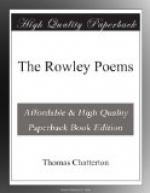This cannot be done so satisfactorily as in the words of Mr. George Catcott of Bristol, to whose very laudable zeal the Publick is indebted for the most considerable part of the following collection. His account of the matter is this: “The first discovery of certain MSS having been deposited in Redclift church, above three centuries ago, was made in the year 1768, at the time of opening the new bridge at Bristol, and was owing to a publication in Farley’s Weekly Journal, 1 October 1768, containing an Account of the ceremonies observed at the opening of the old bridge, taken, as it was said, from a very antient MS. This excited the curiosity of some persons to enquire after the original. The printer, Mr. Farley, could give no account of it, or of the person who brought the copy; but after much enquiry it was discovered, that the person who brought the copy was a youth, between 15 and 16 years of age, whose name was Thomas Chatterton, and whose family had been sextons of Redclift church for near 150 years. His father, who was now dead, had also been master of the free-school in Pile-street. The young man was at first very unwilling to discover from whence he had the original; but, after many promises made to him, he was at last prevailed on to acknowledge, that he had received this, together with many other MSS, from his father, who had found them in a large chest in an upper room over the chapel on the north side of Redclift church.”
Soon after this Mr. Catcott commenced his acquaintance with young Chatterton[1], and, partly as presents partly as purchases, procured from him copies of many of his MSS. in in prose and verse. Other copies were disposed of, in the same way, to Mr. William Barrett, an eminent surgeon at Bristol, who has long been engaged in writing the history of that city. Mr. Barrett also procured from him several fragments, some of a considerable length, written upon vellum[2], which he asserted to be part of his original MSS. In short, in the space of about eighteen months, from October 1768 to April 1770, besides the Poems now published, he produced as many compositions, in prose and verse, under the names of Rowley, Canynge, &c. as would nearly fill such another volume.
In April 1770 Chatterton went to London, and died there in the August following; so that the whole history of this very extraordinary transaction cannot now probably be known with any certainty. Whatever may have been his part in it; whether he was the author, or only the copier (as he constantly asserted) of all these productions; he appears to have kept the secret entirely to himself, and not to have put it in the power of any other person, to bear certain testimony either to his fraud or to his veracity.




